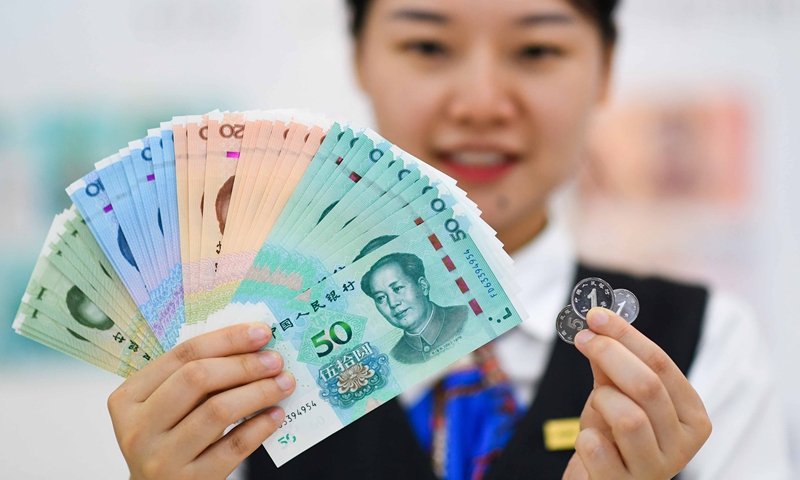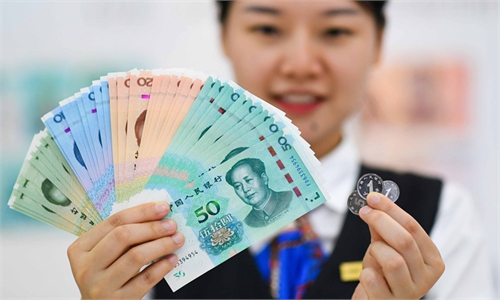
A staff member displays the banknotes and coins included in the 2019 edition of the fifth series of the renminbi at an Industial and Commercial Bank of China (ICBC) branch in Beijing, capital of China, Aug. 30, 2019.(Photo: Xinhua)
Overseas investors increased their holding of Chinese treasury bonds in January, according to official data, telling volumes about China's financial stability and economic resilience as well as a continuation of its financial sector openness, despite lingering global concerns about surging inflation and interest rate hikes that are needed to curb price rises.
It seems that China is determined to push forward greater openness of its financial sector, even though the US has in recent years ramped up its attempt to decouple its economy from China's. And, this resolve makes overseas investors feel at ease when gobbling up yuan-denominated assets, including equities and bonds.
Overseas investors revved up purchases of Chinese government bonds in January, with their holdings totaling 2.52 trillion yuan ($396.6 billion) as of the end of January, Chinese financial news site cls.cn reported on Friday, citing official statistics.
Overseas investors purchased a total of 65.7 billion yuan of Chinese government debt in January, compared with 61.9 billion yuan purchase in December. Their total holdings of China's local government bonds have also grown to 11.8 trillion yuan now.
The increased holdings of Chinese government bonds by overseas institutional investors underline the resilience of the world's second largest economy, which has maintained its monetary policy independence and flexibility, while the US-led cycle of interest rate hikes have roiled global markets.
Overseas funds flowing into Chinese government bonds and Chinese corporate stocks signal an upbeat outlook of China's economic prospects, especially over the longer term. The yuan-denominated assets, which are less correlated with that of developed economies as China has effectively put a lid on inflation, have become increasingly preferred as a safe haven.
Last year, China's domestic bonds held by overseas investors increased by $166.6 billion, making the yuan assets a major part of increased asset holdings by foreign investors, Wang Chunying, deputy head of the State Administration of Foreign Exchange, said at a press conference in Beijing in late January.
The upturn is also a compelling evidence of China's efforts to open its financial market even broader to foreign investors, regardless of the international geopolitical tensions stirred up by the US government in its sinister attempt to contain China's economic and technology rise.
China's bond market, which has become the world's second largest amid the country's financial liberalization push, could be one of the best examples to expound the country's role as a flag bearer of economic globalization, with its market opening allowing for foreign investors to enjoy the dividends of China's rapid economic growth.
As is widely known, the bond connect, a linkup between Chinese mainland and Hong Kong money markets, has enabled a breakthrough in mutual bond market access with the commencement of the northbound trading in July 2017. The much-anticipated southbound trading was also officially up and put into operation in September 2021, making the two-way bond market increasingly globalized with trading readily available both ways.
In an indication of the country's rising profile on the global bonds market, Chinese treasury bonds were included in the FTSE Russell World Government Bond Index in late October.
Looking ahead, China is on a steady track moving for continued financial openness, underpinned by its growing economic prowess and high and new technology advance. This will cement the country's role as a ballast for the global economy, becoming an even stronger player on the global financial landscape, despite the disturbance and stonewalling by the US.



